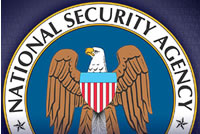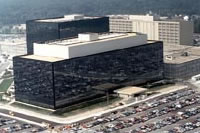 Think carefully the next time you edit your Flickr or Myspace profile. New Scientist reported last week that the Pentagon’s National Security Agency (NSA) “is funding research into the mass harvesting of the information that people post about themselves on social networks.” For many the move is hardly surprising given the ongoing erosion of personal privacy as a result of 9/11 and makes George Orwell and Philip K Dick’s dark imaginings about the workings of big government (they gave us the concepts of thought-crime and pre-crime respectively) a depressing reality.
Think carefully the next time you edit your Flickr or Myspace profile. New Scientist reported last week that the Pentagon’s National Security Agency (NSA) “is funding research into the mass harvesting of the information that people post about themselves on social networks.” For many the move is hardly surprising given the ongoing erosion of personal privacy as a result of 9/11 and makes George Orwell and Philip K Dick’s dark imaginings about the workings of big government (they gave us the concepts of thought-crime and pre-crime respectively) a depressing reality.
Many are saying that it bears all the hallmarks of the Pentagon’s Total Information Awareness program or the “blueprint for the total surveillance society” as it was dubbed by Lee Tien of the EFF. The program aimed to gather digital information from a variety of sources to aid in the tracking and capture of terrorists but was suspended in 2002 after a public outcry over privacy.
The New Scientist report speculates that the NSA plans to use semantic-web tools to plot connections between individuals. A paper promoting just such a process was delivered at the WWW2006 in Edinburgh last month. The paper, titled Semantic Analytics on Social Networks, described how conflict of interest in the scientific peer review process could be avoided by plotting the relationships between individuals, by analyzing the RDF tags of data from the Friend of a Friend (FOAF) social software service and the computer science bibliography website DBLP. New Scientist noted that the research was part-funded by Advanced Research Development Activity who spend the NSA’s research cash.
This news follows the report by USA Today on June 1st that the FBI had asked companies including Google, Microsoft and AOL (amongst others) to store Web usage histories for up to two years to assist with the investigations into child pornography and terrorism. Lee Tien observed that the Justice Department was “asking ISP’s to really become an arm of the government”.
In Europe, the adoption of similar approaches has been attempted with less success. In 2003 the UK All Party Internet Group (APIG) recommended that the government abandon plans to get ISP’s to store usage data for six years but should still ask the companies to keep data as and when law enforcers required.
The APIG report (PDF), which was delivered ahead of the consultation process for the controversial Regulation of Investigatory Powers Act (RIPA) Part 2, made the specific recommendation that
“a specific prohibition should be put into RIPA to prevent access to communications traffic data for ‘predictive use’. If particular patterns of behaviour were highly correlated to criminal behaviour then it might become possible for ‘fishing expeditions’ to detect these patterns to be seen a proportionate action. We agree that this type of access to traffic data raises considerable concern and do not believe it should be permitted under an ‘internal authorisation’ regime.
 In September 2005 the European Commission adopted a proposal that would see telecommunications data held for one year and Internet data for six months and, last month, the European Court annulled the agreement which compelled airlines to submit private data on passengers flying to the US.
In September 2005 the European Commission adopted a proposal that would see telecommunications data held for one year and Internet data for six months and, last month, the European Court annulled the agreement which compelled airlines to submit private data on passengers flying to the US.
It’s not just us that thinks that the Global War on Terror has been used by governments on both sides of the Atlantic to infringe personal liberty with precious little evidence of positive results. Privacy groups have warned about the dangers of “automated intelligence profiling” citing the potential for inaccuracies, misuse and abuse.
Governments have hardly proven themselves capable custodians so far. In the UK recent blunders at the Home Office have seen thousands of individuals wrongly branded as criminals due to inefficient manual administration systems. Add government fecklessness to the huge quantity of incomplete, exaggerated and plain wrong data entered by ourselves about ourselves on social software sites and you could have the ingredients for a totalitarian, bureaucratic hell, worthy of Kafka.